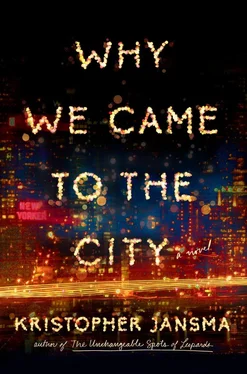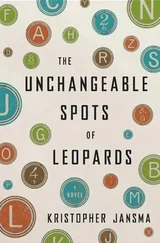Finally she saw Jacob coming from up the block wearing a black top hat and tails, which he’d rented from God knew where. He had on the patent leather shoes and a little cane thing with white tips. He looked like a pudgy Fred Astaire.
“Oh my god, you look amazing!” she yelled.
“I know!” he said. “I mean, so do you!”
He hugged her and felt her shivering. “Why didn’t you meet me inside somewhere?”
She lifted up her arms as if to say that she had no idea, but Jacob thought she was pointing across the street, toward the high fences that marked off the construction site there, and the hundred-story cranes that stood sentinel overhead.
“Oh, I know. Can you believe it? Eight years later and still just a fucking hole in the ground?”
Sara didn’t know what he meant, until she realized that she’d been standing there — trying to live in the moment and to be observant and aware — for twenty minutes directly across the street from Ground Zero without having even the slightest idea that this was where she was standing. The shame of this made her slump into Jacob’s shoulder. She’d never really known the city before the towers had fallen — just one class trip in high school to the Natural History Museum and a family excursion to see Cats. It had happened the third week of Junior year, two years of eager progress suddenly derailed into twenty-four-hour coverage of gray ash and bafflement. Her parents calling to report that so-and-so’s father was all right and that so-and-so’s father was missing, and weepy firefighters, and angry men in suits on CNN, and then shock, and then awe, and then tough and solemn boys in desert camouflage on FOX. And for years after it had felt like progress could be measured only in how much closer they were to rebuilding that wide and brilliant world and then gradually accepting that it would never be rebuilt — that it, too, remained a hole in the landscape.
They walked a little farther and came up to the railing and looked out over the Hudson. A thin crescent of silver moon hung above Jersey City, and Sara tried to squint enough to see the time on the Colgate clock, glowing like an ember at the foot of the huge skyscraper there.
“What’s up with you lately?” he asked. “Every time I see you or Irene it’s like you’re trading off periods or something. At least let George and I have a turn.”
Sara paused, ready to tell Jacob everything and deal with Irene later. “I’m stuck in a subjunctive mood,” she said finally.
“A what?”
“Come on. You’re a poet. The subjunctive. Indicating that everything is possible and contingent. Hypothetical. I’m just having a subjunctive month.”
“A subjunctive March,” Jacob agreed.
Sara looked down. There beneath her three-inch heels was the cold white concrete of Manhattan. An inch beyond them, on the other side of the railing, was the cold, dark roiling river. Here was city, and there was not. Ever shifting though it might be, there was an edge to the city in every given moment. Its beginning and its end. It was a finite thing, after all. And inside the city was one apartment for her and George. And one place where they would exchange their vows and cut a cake and dance to a cover of Bon Jovi. And Irene would tell Jacob at one moment, just as there had been indeed one moment when Irene’s DNA had erred, and just as this very moment now the chemotherapy was either repairing this error or the cancer was growing. Time would tell, as sure as it would also pass. It could not be March forever.
“Come on,” Jacob said, “let’s go crash this wedding. It’ll give me a chance to explain why you don’t really want to get married.”
Sara giggled, though she knew he wasn’t entirely kidding.
“First… you really just can’t tie down a guy like George. He’s got insatiable appetites. He’s got the soul of a rock-and-roll legend inside that nerdy shell. He’s like… you know who he’s like? He’s like Meat Loaf in there. That’s right, there’s a four-hundred-pound, sweaty animal locked up in there who would do any thing for love.”
Sara was laughing so hard, she could hardly breathe. “Thank you,” she said, giving Jacob a kiss on the cheek.
“Let’s make out,” Jacob said. “I’m in love with you. Don’t marry that other guy.”
“Sorry. You missed your chance,” Sara sighed.
“Can I at least sleep in your attic once you get all lame and have a billion kids? Maybe make a little den, up above the garage.”
“Nope,” Sara said. “I won’t have you coming and going at all hours of the night, bringing your conquests to breakfast. What would my billion children think?”
They went on like that for hours. And they did go to the wedding, and they did drink themselves sick on champagne cocktails until they were escorted out by the bride’s brother, a greaser named Mikey who tried to get Sara’s number even as Jacob was attempting to kick him in the shins. And Jacob promised, he promised , he’d come to Long Island for a long weekend at Luther’s beach house in April. Just the idea filled Sara with happiness all the way home, where she burrowed into the Murphy bed beside George, already sound asleep.
George liked solving problems. Finding the square root of x using the Babylonian method. Unjamming the printer in the department office. Determining the number of Sun-like stars in a Brightest Cluster Galaxy based on the ratio of their luminosities. Tracing the most efficient possible route between his parking spot on Riverside between Seventy-second and Seventy-third, and the Borders outside Grand Central from which Jacob had consented to being (in his words) “kidnapped,” and down to East Fourth Street for Irene. Then back up through the Queens Midtown Tunnel and the Long Island Expressway, in early Saturday morning traffic, with a quick detour around an accident near Hauppage, and then onward until exit 70 brought them to the Sunrise Highway. Then Route 51 and the North Fork, where they’d take the ferry over to Shelter Island where Sara’s boss Luther took his family in the summertime, but which for this one weekend belonged to them, for nothing.
It was important to appreciate nice things when you could. Fine wines, good friends, free beach homes. It would be just like old times, back in the dorms. They’d be up all night talking, playing charades and gin rummy, counting stars from the rooftop.
George had a slight headache, the likely result of the whiskey he’d had at one that morning to celebrate the e-mail he’d gotten from an AAS committee member in Belgium inviting him and Allen to speak at the June conference in Pasadena about their mounting discoveries in the Ring Nebula. People were talking about it. Physicists anyway. Terabytes of new data every day that he and Allen were gathering on 237 Lyrae V’s collapse.
He took a long sip from his Einstein thermos, its contents still warm after almost two hours. It was a relief to be leaving the city at last. Get the past few months behind them. Sara had been up half the night, packing and repacking, and now she was asleep in the passenger seat. In the rearview mirror he could see that Irene was texting on her phone and Jacob was dozing. George was glad that they could finally start focusing on what lay ahead. Jacob had booked tastings at some vineyards Oliver had recommended, and Sara had researched the best local seafood spots. Best of all, Irene had been steadily improving since her fourth chemo treatment at the end of March. Dr. Zarrani had seemed to feel things were going well when George had picked her up from the last infusion.
“You may see the lump under her eye getting smaller, although don’t overinterpret this,” Dr. Zarrani had urged. “Sometimes there is some shrinkage due to liquid loss, but that isn’t necessarily indicative of cancerous cell death. Call me immediately if she feels swelling beneath her arms or an ache in her jaw, as this could indicate spreading to the lymphatic systems.”
Читать дальше












